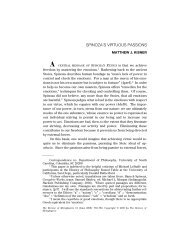heidegger's being and time and national socialism - Philosophy ...
heidegger's being and time and national socialism - Philosophy ...
heidegger's being and time and national socialism - Philosophy ...
Create successful ePaper yourself
Turn your PDF publications into a flip-book with our unique Google optimized e-Paper software.
PHILOSOPHY TODAY<br />
268<br />
been mistranslated in English, namely, as though<br />
authentic Dasein distances itself from destiny or<br />
even destroys it while Heidegger says that<br />
authentic Dasein obeys destiny. 133<br />
A phenomenon in Heidegger’s sense shows itself,<br />
even though unthematically, within the everyday<br />
appearances. 134 Nonetheless, someone<br />
for whom the motif of double forgetting is constitutive<br />
won’t make the validity of his claims dependent<br />
on the agreement of others. 135 Heidegger<br />
emphasizes that his theory of guilt must start with<br />
the everyday underst<strong>and</strong>ing of guilt, 136 but his<br />
justification of his interpretation of the authentic<br />
underst<strong>and</strong>ing of conscience in the light of the<br />
vulgar one is certainly unconvincing. 137 At the<br />
end of the chapter on conscience, he says that he<br />
has existentially deduced “an authentic potentiality-of-<strong>being</strong>-a-whole”<br />
for which, however, the<br />
attestation of Dasein is still lacking. 138 Whether<br />
he regarded §65 or only the chapter on<br />
historicality as the required attestation, 139 at the<br />
beginning of §74 he says that the interpretation<br />
of historicality is just “a more concrete working<br />
out of temporality” which was first revealed in<br />
anticipatory resoluteness. 140 This is certainly the<br />
case inasmuch as, in §74, he enacts—finally,<br />
from the perspective of the main agent, destiny—<br />
the realization of what, in the section on the temporality<br />
of everydayness, he had announced as a<br />
possibility opened up in anxiety (<strong>and</strong> which, in<br />
turn, he had already anticipated in the passage on<br />
the different kinds of solicitude in §26). However,<br />
Heidegger might also say so because he was<br />
aware that, while in no way everything he had<br />
developed in Division Two was phenomenologically<br />
sound, his presentation of the notion of<br />
historicality could be recognized by everyone interested<br />
in these matters as “as brilliant a summary<br />
of revolutionary rightist politics as one<br />
could wish for.” 141 In fact, not only his notion of<br />
historicality but also his theory of the four types<br />
of solicitude, decisive parts of his theory of the<br />
They, if not the whole theory, his Kant interpretation<br />
<strong>and</strong> the theory of modernity in the section on<br />
conscience, <strong>and</strong>, as will become clear in the last<br />
section, also the notion of anticipatory resoluteness—in<br />
all these theories Heidegger just summarized<br />
on an abstract level <strong>and</strong> in his own vernacular<br />
theories that had been developed in much<br />
more detail in Scheler’s book Formalism in Ethics,<br />
Scheler’s other extensive writings on modernity<br />
<strong>and</strong> Ferdin<strong>and</strong> Tönnies’ “classic” book<br />
Gemeinschaft und Gesellschaft from 1887, but<br />
also in other texts from the then heated debate<br />
about community <strong>and</strong> society. 142 It was his own<br />
doing that, in his summaries of these texts, he<br />
cleansed from them elements in virtue of which<br />
Scheler <strong>and</strong> other authors could distance themselves<br />
from the propagators of the community of<br />
the people; that he combined them with other<br />
existentials under the super-existential of care;<br />
that he worked out the temporality of care <strong>and</strong> anticipatory<br />
resoluteness more concretely in the<br />
section on historicality; <strong>and</strong> that he inserted in<br />
this section, the culmination of the entire book<br />
Being <strong>and</strong> Time, an option for the National Socialists.<br />
Heidegger has been introduced in the USA<br />
mainly by Löwith, Hannah Arendt, <strong>and</strong> Derrida,<br />
all philosophers of postmodern singularization,<br />
though in very different ways. 143 In addition, the<br />
sentence from the third part of §74 that I just<br />
mentioned is not the only one that has been translated<br />
falsely or misleadingly. Furthermore, the<br />
proverbial American self-made man determines<br />
his fate by himself. 144 Moreover, Americans normally<br />
don’t know that much about history of<br />
ideas in other countries <strong>and</strong> thus are, for example,<br />
not aware that, at Heidegger’s <strong>time</strong>, the “German”—i.e.,<br />
conservative <strong>and</strong> rightist—notion of<br />
destiny <strong>and</strong> fate included that only stubborn,<br />
hubristic, or stupid people try to resist fate while<br />
prudent ones obey it. 145 Finally, there are the principle<br />
of charity in hermeneutics <strong>and</strong> a premium<br />
on “creative” interpretation in colleges <strong>and</strong> universities<br />
in the USA. 146 Thus it is, in a way, no<br />
wonder that American readers have a hard <strong>time</strong> to<br />
recognize the thoroughly rightist character of Being<br />
<strong>and</strong> Time. Paul Tillich diagnosed “weariness<br />
with autonomy” in the background of the political<br />
events during Weimar Republic. 147 For a<br />
rightist, to submit to destiny <strong>and</strong> fate was not fatalism<br />
or “unmanly” but rather redemption from<br />
the supposed isolation in society <strong>and</strong> entrance<br />
into something common, destiny <strong>and</strong> community.<br />
Heidegger uses “a logic not of recognition
















